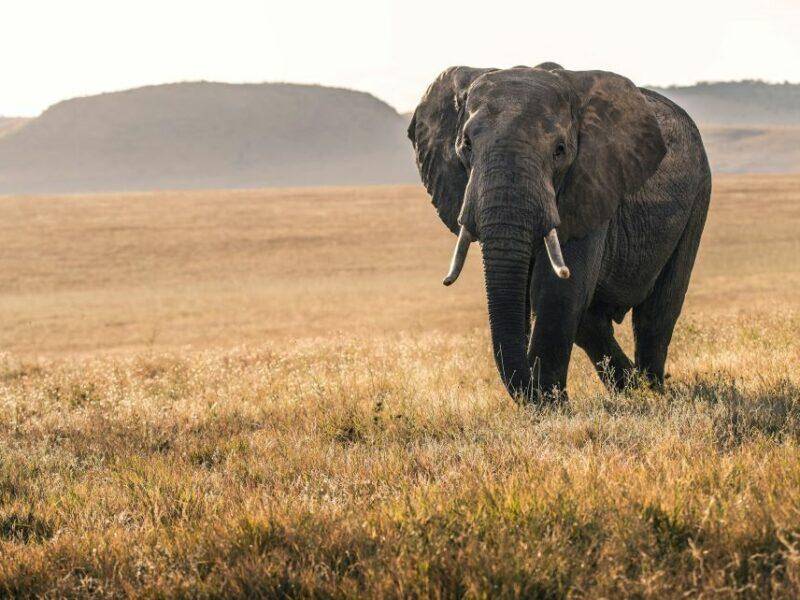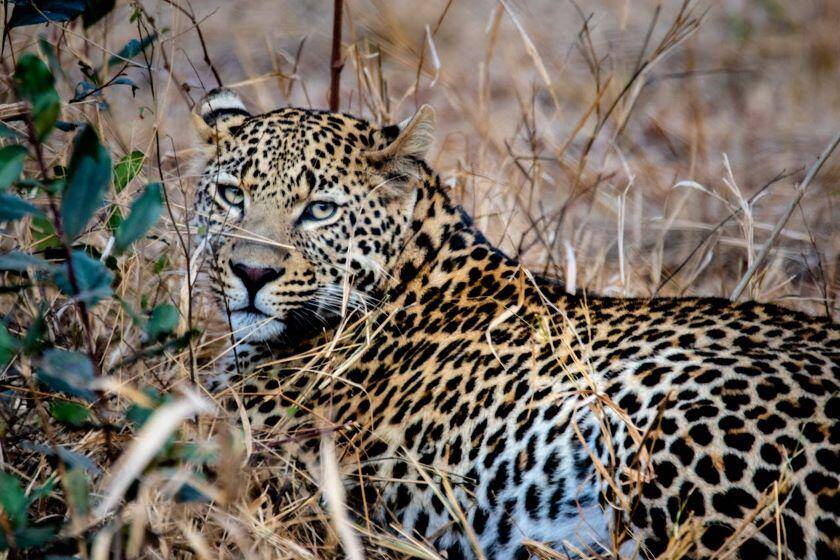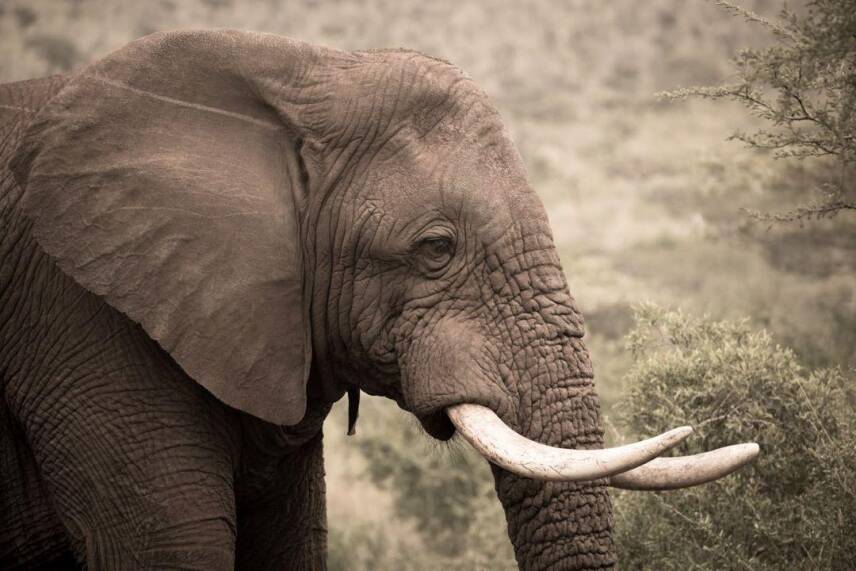When we think of African safaris, the term “Big Five” often comes to mind. But why are these animals grouped together under this iconic label? The Big Five—comprising the African Elephant, Cape Buffalo, Leopard, Lion, and Rhinoceros—earned their title not because of their size, but due to the difficulty and danger involved in hunting them on foot.
During the golden years of safari, these animals represented the ultimate challenge for hunters. Tracking an elephant or buffalo could take days, while hunting a lion or leopard required immense patience and skill. Over time, the Big Five have transcended their origins in trophy hunting to become symbols of Africa’s rich biodiversity and conservation efforts. Understanding why they’re called the Big Five helps us appreciate not just their historical significance, but also their role in modern wildlife conservation.
[DYNAMIC-BLOGTABLEOFCONTENT]
Key Takeaways
- The term “Big Five” refers to the African Elephant, Cape Buffalo, Leopard,Lion, and Rhinoceros, not because of their size, but due to the difficulty and danger involved in hunting them on foot.
- Big Game hunting has historical roots in the challenges posed by tracking and hunting these animals, which required patience, skill, and endurance.
- The Big Five have transitioned from being hunted trophies to symbols of Africa’s biodiversity and conservation efforts.
- Modern hunting safaris blend adventure with ethical considerations, emphasizing conservation, proper wildlife management, and community support.
- Misconceptions exist about the Big Five, including erroneous beliefs about their size and their role, with modern hunts focused on balancing ecosystems and supporting conservation financially.
- Different types of safaris offer varied experiences, including Big Five Safaris, Plains Game Safaris, and specialized hunts, each with unique preparation and ethical guidelines.
Game hunting safaris conjure images of vast African landscapes teeming with wildlife. Let’s dive deeper into this adventuring world.
History of the Term “Big Five”
Big game hunting in Africa isn’t just about the adrenaline rush. It’s steeped in history, culture, and a profound connection to nature. Our ancestors have hunted for survival, and this tradition evolved into an exhilarating pursuit.
Choosing the Right Safari
Selecting the perfect hunting safari involves several considerations. Do you prefer an African hunting safari focusing on specific species like lions, leopards, or Cape buffalo? Or are you looking for an all-encompassing experience? Each option offers unique challenges and rewards.
Different Types of Safaris
- Big Five Safari: Focuses on the most sought-after African game animals: elephant, rhino, buffalo, lion, and leopard.
- Plains Game Safari: Targets species like impala, kudu, and springbok.
- Specialized Hunts: Tailored for specific animals, such as crocodiles hunting or hyena hunting.

Preparing for Your Safari
Preparation is key. From selecting the right gear to ensuring you’re fit enough for the demands of the hunt, there’s much to consider. What kind of rifle suits your needs? Are you comfortable with long treks? Let’s break it down.
Gear and Equipment
- Firearms: Choose rifles suited to the game, like .375 H&H for larger animals and .30-06 for smaller ones.
- Clothing: Lightweight, breathable fabrics for daytime; warmer layers for evenings.
- Accessories: Binoculars, hats, sunglasses, and sunscreen are essentials.
Physical Fitness
It’s not just about shooting skills; stamina counts. Regular exercise, tailored to walking long distances, enhances your safari experience.
Ethical Considerations
Game hunting safaris today emphasize conservation. Managed hunts help control populations, fund conservation projects, and support local communities. Understand the ethical guidelines before embarking on your journey.
Ethical Hunting Practices
- Respect for Wildlife: Always aim for a clean, humane shot.
- Utilization: Use as much of the animal as possible; donate meat to local communities.
- Conservation Fees: Funds from hunting licenses often go directly to conservation efforts.
Tips for a Successful Safari
Every hunter has their own tips and tricks, but some are universal. Patience, respect for the environment, and a keen eye are critical.
- Scout Locations: Study maps and speak to experienced guides.
- Stay Quiet: Minimize noise to avoid alarming game.
- Practice Shooting: Regular practice ensures accuracy.
Ready for the adventure of a lifetime? Visit / for more information on planning your perfect hunting trip.
The Animals Included in the Big Five
The “Big Five” consists of the African Elephant, Cape Buffalo, Leopard, Lion, and Rhinoceros. Each species presents unique challenges and showcases Africa’s rich biodiversity.
Lion
The lion is often called the “King of the Jungle.” These powerful predators exhibit a strict social structure within prides. They hunt in groups, making them formidable opponents. Lions symbolize strength and courage, dominating the savanna with their majestic presence.
Elephant
African elephants, the largest land animals on the planet, require incredible patience and physical stamina to hunt. Tracking these giants can take days, covering vast distances. Their size and intelligence make them both awe-inspiring and challenging to encounter up close.
Rhinoceros
Rhinoceros hunting demands skill and ethical considerations due to their conservation status. These massive creatures, with their robust build and formidable horns, are often found in thick brush. Rhinos symbolize the delicate balance between preservation and the human need for adventure.
Leopard
Leopard hunting in Africa is a test of patience and strategy, as these elusive cats are primarily nocturnal. Hunting leopards involves setting bait and waiting in blinds for several nights. Their solitary and secretive nature makes spotting them a rare and rewarding experience.
Cape Buffalo
Cape buffaloes, known for their unpredictable nature, are found in densely wooded savannas. African cape buffalo hunts often result in close encounters, with shots ranging from thirty to eighty meters. These hunts are exhilarating and demand a hunter’s full attention and skill.
For more details on planning your adventure, visit Game Hunting Safaris.
Game hunting safaris offer thrill-seekers and wildlife enthusiasts unique experiences in the heart of Africa. The continent’s vast landscapes and rich biodiversity make it a prime destination for hunters and conservationists alike. In this article, we’ll dive into the complexities and excitement of game hunting safaris. For more information, visit Game Hunting Safaris.

The Big Five Experience
African Elephant
Tracking an elephant requires patience and skill. These giants can silently vanish into the bush, making the hunt unexpectedly challenging. Plus, their keen senses demand a cautious approach to avoid detection.
Cape Buffalo
Known for their unpredictable nature, cape buffaloes can be highly dangerous. Hunters need to be ready for sudden charges. These encounters often require quick reflexes and a steady hand.
Leopard
Leopard hunting is a game of wit and stamina. These nocturnal animals are elusive, often requiring night hunts. Scent and sight are critical, so hunters must be meticulous in their approach.
Lion
Lions, with their social structure, offer a distinctive challenge. They often move in prides, and identifying the right target requires expertise. Their strength and agility make close encounters particularly intense.
Rhinoceros
Rhinoceros hunts are heavily regulated due to conservation efforts. Ethical hunting practices are paramount to ensure their populations remain stable. This usually means strict quotas and high fees.
Safety Guidelines
Understand Local Regulations
Each country has its hunting regulations. Familiarize yourself with them to avoid legal issues. This includes permit requirements and species-specific rules.
Emergency Preparedness
Wildlife encounters can be unpredictable. Carry a first aid kit and know basic first aid procedures. Having a satellite phone for remote areas can be a lifesaver.
Tips for Success
Patient Observation
Take your time to observe animal behaviors. This can offer insights into their patterns, increasing your chances of a successful hunt.
Physical Preparation
Hunts can be physically demanding. Be in good shape to handle long treks and challenging terrain. Regular exercise beforehand can make a big difference.
Respect Wildlife
Above all, respect the animals and their habitat. Ethical hunting prioritizes conservation, ensuring future generations can enjoy the same experiences.
Game hunting safaris in Africa aren’t just about the thrill of the chase. They’re an opportunity to connect with nature in a profound way. Whether you’re tracking the mighty elephant or the stealthy leopard, each hunt leaves an indelible mark on your soul. Ready to start planning yours? Head over to Game Hunting Safaris and embark on your adventure.
Misconceptions About the Big Five
Many people believe the Big Five animals got their name because they’re the largest animals in Africa. However, this isn’t true. The term “Big Five” originated from the most challenging animals to hunt on foot, not their size. The African Elephant, Cape Buffalo, Leopard, Lion, and Rhinoceros posed significant dangers and required great skill and patience.
Another common misconception is that the Big Five label includes the continent’s most popular or iconic animals. While true to an extent, the list exempts other notable species like the hippopotamus or the giraffe. The focus is strictly on the difficulty and danger associated with these five animals during hunting expeditions.
There’s also a misunderstanding that Big Five hunting is purely recreational. While historical big game hunting emphasized the sport, modern practices intertwine with conservation efforts. Fees from regulated hunting trips help fund conservation projects, supporting the preservation of these majestic animals.
Some might think Big Five hunts are a thing of the past. Although traditional, these hunts remain relevant in contemporary wildlife management. Controlled hunts balance ecosystems and contribute to the economy through ecotourism and safari-related income.
Lastly, people often assume all African wildlife safaris are synonymous with Big Five hunts. Not every safari includes tracking these specific animals. Specialized hunts like Cape Buffalo hunts, Leopard hunting, or even activities like hyena hunting and crocodiles hunting offer varied experiences. For more insights, visit Game Hunting Safaris.
Explore different facets of African wildlife and expand your understanding beyond common misconceptions about the Big Five.
Conclusion
Understanding the origins and significance of the Big Five enriches our appreciation for these majestic creatures. While their name stems from the challenges of hunting them on foot, today they symbolize Africa’s incredible biodiversity and the importance of conservation.
Planning a safari to see the Big Five offers an unparalleled adventure in Africa’s stunning landscapes. It also supports local economies and conservation efforts, ensuring these iconic animals thrive for future generations.
By prioritizing responsible and ethical practices, we can enjoy the thrill of encountering the Big Five while contributing to their preservation. Let’s embark on our own adventures, mindful of the impact we have on these magnificent creatures and their habitats.
Frequently Asked Questions
What are the “Big Five” animals in African safaris?
The “Big Five” refer to the African Elephant, Cape Buffalo, Leopard, Lion, and Rhinoceros. This term originated due to the difficulty and danger involved in hunting these animals on foot.
Why are they called the “Big Five”?
The name “Big Five” doesn’t refer to their size but to the challenge and danger of hunting them. They required significant skill and patience to track and hunt on foot.
How do the Big Five contribute to wildlife conservation?
The Big Five play a crucial role in attracting tourists, which boosts local economies and funds conservation projects through responsible and regulated tourism and hunting.
What types of safaris are available in Africa?
Different types of safaris include the Big Five Safari, Plains Game Safari, and specialized hunts, each offering unique experiences and focusing on various species and activities.
Are hunting safaris harmful to wildlife?
When conducted responsibly, hunting safaris can benefit conservation by managing animal populations and funding preservation efforts through regulated fees.
What should I consider when planning a safari?
Key considerations include choosing the right destination, selecting a reputable operator, and preparing essential gear such as firearms, clothing, and equipment. Understanding local regulations and safety guidelines is also crucial.
Why is responsible hunting important in conservation?
Controlled and ethical hunting helps manage wildlife populations and provides financial resources for conservation programs, supporting long-term biodiversity and habitat preservation.
What misconceptions exist about the Big Five?
A common misconception is that the name refers to their size, whereas it actually relates to the difficulty of hunting them. Another is that they are the only notable species in Africa, overlooking the continent’s diverse wildlife.
How can I prepare for a successful safari experience?
Success on a safari involves patient observation, physical preparation, and respecting wildlife. Familiarity with local regulations and safety practices is essential.
How do safaris benefit local communities?
Tourism from safaris supports local economies by creating jobs, funding community projects, and promoting sustainable development through conservation efforts.
